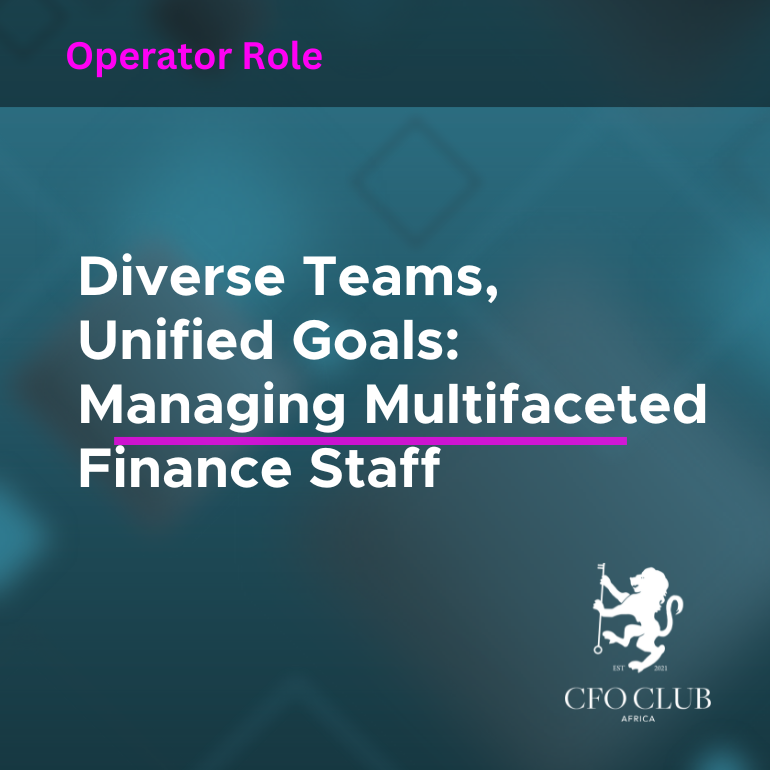Diverse Teams, Unified Goals: Managing Multifaceted Finance Staff
In today’s dynamic business environment, finance teams have evolved into diverse groups with different skills, experiences, and perspectives. Managing these multifaceted teams requires a fresh approach, particularly for CFOs who are tasked with not only overseeing financial performance but also ensuring the cohesion and effectiveness of their finance staff. This article explores practical strategies that CFOs can implement to create a unified team, even when faced with diversity in skills, background, and work styles.
Understanding the Importance of Diversity in Finance Teams
Diversity within a finance team goes beyond gender, race, or cultural differences. It includes variations in professional backgrounds, areas of expertise, and ways of thinking. While some team members may be proficient in traditional accounting practices, others may excel in data analytics, risk management, or even tech-driven financial innovations. As a CFO, it’s crucial to recognise that this diversity is a strength, allowing the team to approach challenges from multiple angles and offer innovative solutions.
However, a diverse team can also present management challenges. Different work styles, communication preferences, and problem-solving approaches may create friction. The goal is to harness this diversity to work towards unified objectives, fostering collaboration and a shared purpose.
1. Create Clear, Unified Goals
The first step to managing a diverse finance team effectively is ensuring that everyone understands the broader organisational goals. As CFO, you need to articulate a clear financial vision that transcends individual tasks and roles. Whether your focus is on optimising cash flow, improving financial reporting accuracy, or navigating regulatory challenges, everyone on your team should know how their work contributes to these goals.
Setting clear KPIs and ensuring that these are communicated across the team is essential. By aligning your team’s efforts towards common objectives, you can minimise any fragmentation that may arise from the varied perspectives within the group.
2. Encourage Open Communication
A common pitfall in managing diverse teams is the breakdown of communication. Some team members may have a more analytical approach, while others may rely on intuition or experience to drive decisions. These differences in how people process information can lead to misunderstandings if communication is not clear and open.
As CFO, it’s your responsibility to create an environment where all voices are heard and respected. Encourage open forums for discussion, regular check-ins, and team meetings where everyone feels comfortable sharing their insights. This not only promotes collaboration but also enhances problem-solving by ensuring that diverse perspectives are considered.
3. Leverage Each Team Member’s Strengths
One of the key skills of an effective CFO is recognising and leveraging the unique strengths of each team member. For instance, someone with strong technical skills in data analytics might not excel at traditional bookkeeping, but their ability to interpret data trends can drive better financial forecasting. On the other hand, a team member with deep expertise in regulatory compliance can help ensure the company stays on the right side of evolving laws.
By identifying these strengths and assigning tasks that align with each team member’s capabilities, you can create a more engaged and productive team. Tailoring responsibilities according to individual strengths allows the finance team to perform at its best while also ensuring that no one feels out of their depth.
4. Invest in Continuous Development
The finance landscape is continually evolving, with new technologies, regulations, and methodologies changing how work gets done. CFOs must ensure that their teams stay up to date with these changes by providing ongoing learning opportunities. Encourage your staff to pursue certifications, attend relevant workshops, or even take part in cross-functional projects that can expand their skill sets.
By fostering a culture of continuous development, you ensure that your team members are not only competent in their current roles but also prepared for the future. Moreover, this commitment to growth can help bridge any skill gaps within the team, ensuring that you are always equipped to meet emerging challenges.
5. Promote a Collaborative Work Culture
Despite their different roles, all members of a finance team need to work towards a common purpose. Promoting collaboration is essential, particularly in a diverse team where individuals may not always see eye to eye. Use technology to your advantage—collaboration tools such as cloud-based accounting systems, project management software, or even instant messaging platforms can help keep everyone aligned.
But collaboration isn’t just about tools; it’s also about mindset. Promote a culture where team members see one another as partners rather than competitors. Encourage them to share knowledge, mentor one another, and solve problems together. This not only strengthens team bonds but also ensures that the entire finance function operates as a cohesive unit.
6. Celebrate Successes and Learn from Challenges
Finally, as CFO, it’s important to celebrate the successes of your diverse team. When a challenging project is completed or a financial target is achieved, recognise the contributions of everyone involved. Celebrating milestones fosters a positive work environment and reinforces the sense of unity within the team.
Equally, use setbacks as learning opportunities. When things don’t go as planned, hold constructive debriefs to understand what went wrong and how the team can improve. This helps build resilience and ensures continuous improvement within your team.
Conclusion: Building Unified Teams from Diverse Skills
Managing a multifaceted finance team may seem daunting at first, but with the right approach, it can lead to enhanced performance and innovation. By focusing on clear goals, encouraging open communication, leveraging strengths, promoting collaboration, and investing in continuous development, you can turn your team’s diversity into its greatest asset. As a CFO in South Africa, mastering these skills will not only make you a more effective leader but also ensure that your finance function thrives in an increasingly complex business landscape.
Embrace the diversity within your team, and you’ll find that unified goals are not just possible—they’re inevitable.

